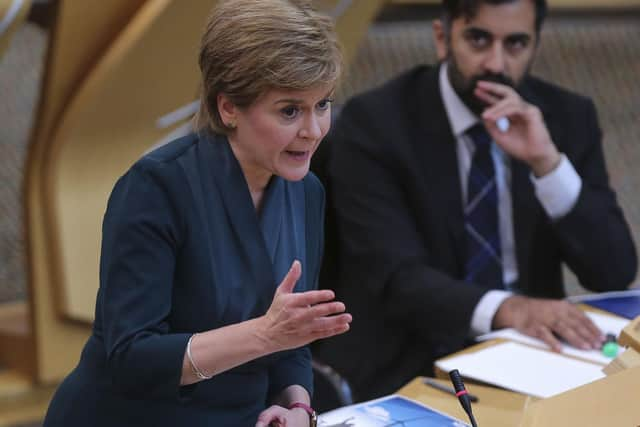Scottish independence referendum still seems unlikely to happen any time soon – Ian Swanson
and live on Freeview channel 276
[Let us know what you think and join the conversation at the bottom of this article.]
Addressing the virtual gathering, Nicola Sturgeon reaffirmed her commitment to another referendum – Covid-permitting, by the end of 2023 – and presented the choice for the future as “a Westminster Tory government rejected by the people of Scotland and taking us in the wrong direction... or an independent Scotland with governments people vote for and the full range of powers needed to make our country all it can be”.
There was another boost for the SNP and independence with claims in a new book that Boris Johnson wants to beat Margaret Thatcher’s 11 years in Number Ten. The prospect of nearly a decade more of Johnson rule is likely to persuade many Scots to seek another option.
Advertisement
Hide AdAdvertisement
Hide AdBut the referendum which Ms Sturgeon promises still seems unlikely any time soon.
Although the First Minister told the conference she wanted a 2014-style agreement between the UK and Scottish governments on holding a fresh vote, Mr Johnson has previously declared there won’t be one as long as he’s Prime Minister.
And although other ministers have talked about reconsidering the possibility of another referendum if support for independence was consistently above 60 per cent, that threshold is currently a long way off.


And it doesn’t look as if either side is really ready for a referendum. In her programme for government last week, Ms Sturgeon announced civil servants would restart work on a prospectus for an independent Scotland, but a referendum bill was notable by its absence.
Advertisement
Hide AdAdvertisement
Hide AdThe SNP also needs to develop its case for independence and provide answers on key issues which worried voters last time, including the currency and future EU membership.
And on the No side, it is unclear how the opposition to independence will be organised for a new referendum – it’s unlikely to be a repeat of the Better Together campaign.
A lot has happened since the last referendum – and as the seventh anniversary approaches this weekend, everyone recognises the circumstances are different.
Brexit has complicated the situation because if an independent Scotland rejoins the EU that will make Scotland’s border with England more significant; the conditions for Scotland’s re-entry could raise issues; and the whole experience of the protracted disentangling of the UK from the rest of Europe may put people off a potentially similar exercise for Scotland to separate from the rest of the UK.
Advertisement
Hide AdAdvertisement
Hide AdAnd when it comes to Covid, the successful vaccine roll-out is cited by some as a benefit of being in the UK.
On the other hand, the SNP points to the chaos and empty shelves arising from Brexit; Scotland being forced to leave the EU against its will; the success which similar-sized countries make of governing themselves; and Mr Johnson’s chaotic management of the pandemic.
However, a UK-wide poll putting Labour ahead of the Tories for the first time since January could be bad news for the SNP. If voters think Labour could oust Mr Johnson, they may may decide they don’t have to go as far as independence to escape the Tories.
A message from the Editor:
Thank you for reading this article. We're more reliant on your support than ever as the shift in consumer habits brought about by coronavirus impacts our advertisers.
If you haven't already, please consider supporting our trusted, fact-checked journalism by taking out a digital subscription.
Comment Guidelines
National World encourages reader discussion on our stories. User feedback, insights and back-and-forth exchanges add a rich layer of context to reporting. Please review our Community Guidelines before commenting.